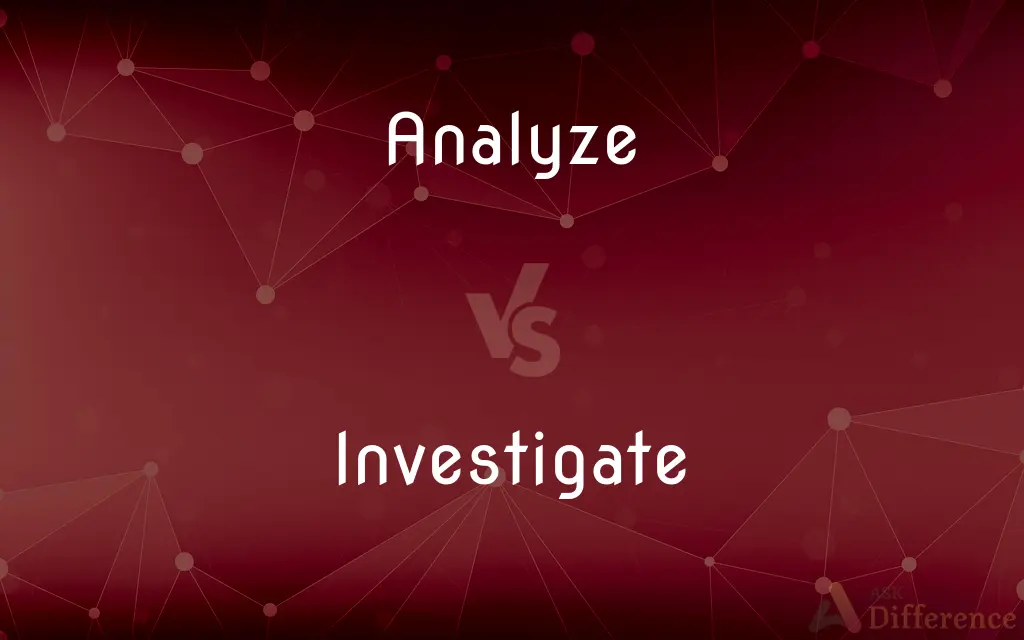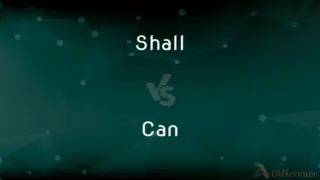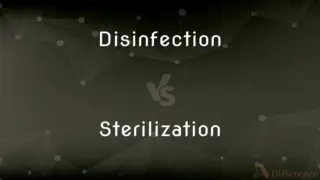Analyze vs. Investigate — What's the Difference?
By Tayyaba Rehman & Maham Liaqat — Updated on April 6, 2024
Analyzing involves examining something methodically to understand its components or structure, while investigating focuses on systematically researching or examining subject to uncover facts, especially to solve problem or answer a question.

Difference Between Analyze and Investigate
Table of Contents
ADVERTISEMENT
Key Differences
Analyzing and investigating are two critical processes used in various fields to gain insights, solve problems, or make decisions, but they serve different purposes and follow distinct approaches. On the other hand, investigation is more about a quest for information, often with a specific goal or question in mind.
While analysis often follows the collection of data or information, providing insights into the nature, function, or relationships of the subject, investigation is a broader process that includes not just analysis but also the gathering of information or evidence. An investigator seeks to uncover new information or solve mysteries, whereas an analyst focuses on making sense of existing information.
The tools and methods used in analysis and investigation can overlap, but their objectives set them apart. Analysts might use statistical methods, models, or theories to interpret data, while investigators might employ interviews, surveys, or forensic techniques to gather new information.
Both analysis and investigation are crucial for advancing knowledge, solving problems, and making informed decisions. However, understanding their differences is essential for applying the correct approach to a given situation. Whether one is analyzing the components of a chemical compound or investigating the circumstances of a crime, the goal is to bring clarity to complex issues through systematic and methodical processes.
Comparison Chart
Definition
Examining something methodically to understand its structure or components.
Systematically researching to uncover facts or information.
ADVERTISEMENT
Purpose
To understand or explain the nature, function, or relationships within the subject.
To discover new information, solve problems, or answer questions.
Approach
Breaks down complex data or information into smaller parts for better understanding.
Involves collecting data or evidence to examine and draw conclusions.
Common Contexts
Science, business, literature, data analysis.
Law enforcement, journalism, scientific research, historical research.
Tools/Methods
Statistical methods, models, theoretical frameworks.
Interviews, surveys, forensic analysis, observational studies.
Compare with Definitions
Analyze
Studying market trends to identify investment opportunities.
Analysts analyze stock patterns to predict future movements.
Investigate
Examining a company's financial records for fraud.
Auditors investigated the company after discrepancies were found.
Analyze
Understanding relationships within ecological data.
Ecologists analyze species data to track environmental changes.
Investigate
Researching a scientific phenomenon through experiments.
Scientists investigated the effects of climate change on coral reefs.
Analyze
Evaluating a computer program's code to improve efficiency.
The developer analyzed the code to find bottlenecks.
Investigate
Conducting interviews to write a news article.
Journalists investigated political corruption by talking to insiders.
Analyze
To dissect a poem's themes and stylistic devices.
The student analyzed the poem to understand its impact on modern literature.
Investigate
Probing a crime scene to gather evidence.
Detectives investigated the area where the crime was reported.
Analyze
Breaking down a historical event to understand its causes.
Historians analyze primary sources to interpret events accurately.
Investigate
Exploring ancient ruins to learn about past civilizations.
Archaeologists investigated the site to uncover its historical significance.
Analyze
To examine methodically by separating into parts and studying their interrelations.
Investigate
Carry out a systematic or formal inquiry to discover and examine the facts of (an incident, allegation, etc.) so as to establish the truth
Police are investigating a claim that the man was beaten unconscious by a gang
Analyze
(Chemistry) To make a chemical analysis of.
Investigate
To observe or inquire into in detail; examine systematically
Investigate a crime.
Investigate ways to use less energy.
Investigate whether the virus is contagious.
Analyze
(Mathematics) To make a mathematical analysis of.
Investigate
To make a detailed inquiry or systematic examination.
Analyze
To psychoanalyze.
Investigate
(transitive) To inquire into or study in order to ascertain facts or information.
To investigate the causes of natural phenomena
Analyze
(transitive) To subject to analysis.
Investigate
(transitive) To examine, look into, or scrutinize in order to discover something hidden or secret.
To investigate an unsolved murder
Analyze
(transitive) To resolve (anything complex) into its elements.
Investigate
(intransitive) To conduct an inquiry or examination.
Analyze
(transitive) To separate into the constituent parts, for the purpose of an examination of each separately.
Investigate
To follow up step by step by patient inquiry or observation; to trace or track mentally; to search into; to inquire and examine into with care and accuracy; to find out by careful inquisition; as, to investigate the causes of natural phenomena.
Analyze
(transitive) To examine in such a manner as to ascertain the elements or nature of the thing examined; as, to analyze a fossil substance, to analyze a sentence or a word, or to analyze an action to ascertain its morality.
Investigate
To pursue a course of investigation and study; to make investigation.
Analyze
To subject to analysis; to resolve (anything complex) into its elements; to separate into the constituent parts, for the purpose of an examination of each separately; to examine in such a manner as to ascertain the elements or nature of the thing examined; to consider in detail in order to discover essential features or meaning; as, to analyze an action to ascertain its morality; to analyse a sonnet by Shakespeare; to analyse the evidence in a criminal trial; to analyse your real motives.
No one, I presume, can analyze the sensations of pleasure or pain.
Investigate
Investigate scientifically;
Let's investigate the syntax of Chinese
Analyze
Make a mathematical, chemical, or grammatical analysis of; break down into components or essential features; as, to analyse a specimen; to analyze a fossil substance; to analyze a sentence or a word; to analyse a chemical compound.
Investigate
Conduct an inquiry or investigation of;
The district attorney's office investigated reports of possible irregularities
Inquire into the disappearance of the rich old lady
Analyze
Subject to psychoanalytic treatment.
Analyze
Consider in detail and subject to an analysis in order to discover essential features or meaning;
Analyze a sonnet by Shakespeare
Analyze the evidence in a criminal trial
Analyze your real motives
Analyze
Make a mathematical, chemical, or grammatical analysis of; break down into components or essential features;
Analyze a specimen
Analyze a sentence
Analyze a chemical compound
Analyze
Break down into components or essential features;
Analyze today's financial market
Analyze
Subject to psychoanalytic treatment;
I was analyzed in Vienna by a famous psychiatrist
Common Curiosities
What is the main goal of analysis?
The main goal is to understand or explain the nature, function, or relationships within a subject by breaking it down methodically.
Why are both analysis and investigation important in research?
They are crucial for advancing knowledge, solving problems, and making informed decisions, with each providing different insights and understandings.
How does the purpose of analysis differ in literature vs. science?
In literature, analysis might focus on themes, motifs, and narrative techniques, while in science, it aims to understand phenomena, relationships, and causality.
When is an investigation typically conducted?
Investigations are conducted when there is a need to uncover facts, solve a problem, or answer a specific question, often starting with a hypothesis.
How do analysis and investigation differ in approach?
Analysis focuses on understanding existing information by breaking it down, while investigation seeks to uncover new information or evidence through a detailed examination.
Can one person perform both analysis and investigation?
Yes, a person can perform both roles, especially in fields like scientific research, where gathering new data (investigation) and interpreting it (analysis) are part of the research process.
Can investigation include analysis?
Yes, investigation often includes analysis as part of the process to draw conclusions from collected data or evidence.
How do analysts and investigators share findings?
Both share their findings through reports, publications, or presentations, tailored to their audience's needs and the context of their work.
What tools are unique to investigation?
Tools like interviews, forensic analysis, and observational studies are more uniquely associated with investigation, especially in law enforcement and journalism.
What skills are essential for successful analysis and investigation?
Critical thinking, attention to detail, methodological approach, and the ability to draw conclusions from data are essential for both processes.
Share Your Discovery

Previous Comparison
Shall vs. Can
Next Comparison
Disinfection vs. SterilizationAuthor Spotlight
Written by
Tayyaba RehmanTayyaba Rehman is a distinguished writer, currently serving as a primary contributor to askdifference.com. As a researcher in semantics and etymology, Tayyaba's passion for the complexity of languages and their distinctions has found a perfect home on the platform. Tayyaba delves into the intricacies of language, distinguishing between commonly confused words and phrases, thereby providing clarity for readers worldwide.
Co-written by
Maham Liaqat













































